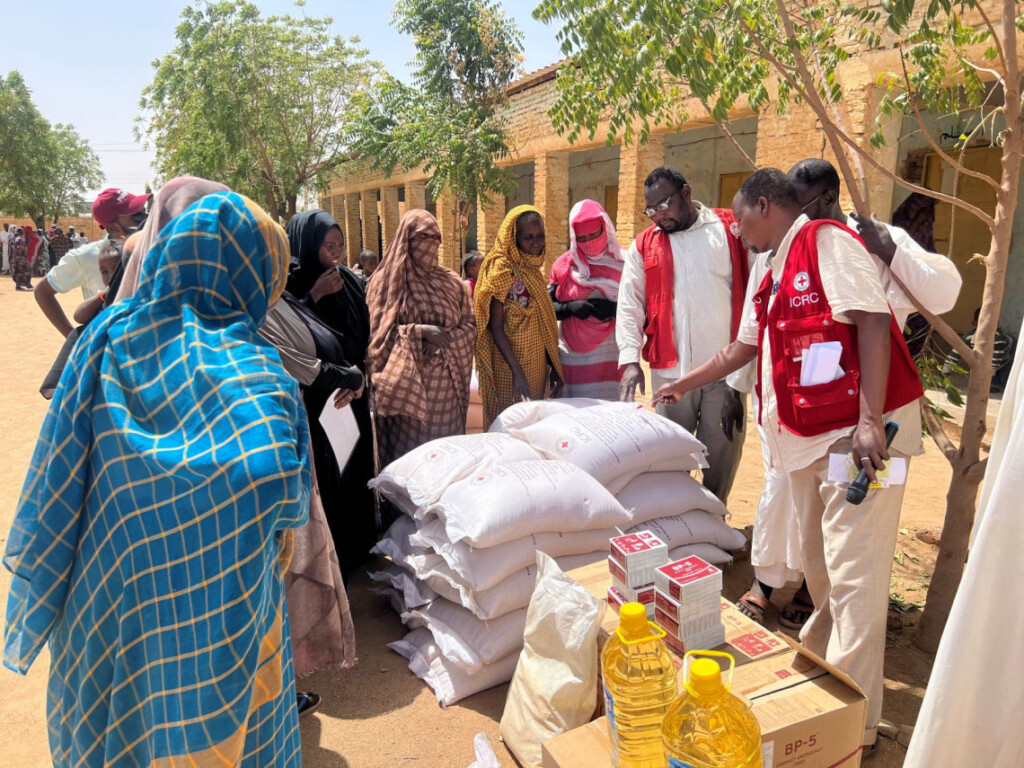Red Cross president laments ‘failure to protect civilians in armed conflict’

Food distribution by the International Committee of the Red Cross in Kassala (Photo: ICRC)
Mirjana Splojaric, president of the International Committee of the Red Cross (ICRC), expressed her dissatisfaction with the continuation of conflicts in various parts of the world yesterday, lamenting the failure to protect civilians.
“Today, from the Democratic Republic of the Congo to Gaza, Sudan, Ukraine, and Yemen, we are witnessing a global and collective failure to protect civilians in armed conflicts,” said Splojaric.
She made the statement during the sessions of the first international follow-up conference on the Political Declaration on Strengthening the Protection of Civilians from the Humanitarian Consequences Arising from the Use of Explosive Weapons in Populated Areas (EWIPA) which is taking place in Oslo, Norway, this week.
The conference will bring together senior officials and experts from ministries of defence and foreign affairs, armed forces, international and regional organisations, civil society, private sector, and academia. In November 2022, over 80 countries endorsed the declaration as a potential tool for protecting civilians and infrastructure during armed conflict.
She added that the human losses resulting from these wars, which are exacerbated by the use of heavy explosives in populated areas, are unacceptable.
The results are “devastating,” said the international official, especially in urban centres. “ICRC teams on the ground have seen scores of civilians killed or injured, often left with permanent disabilities or serious mental trauma. Cities are reduced to rubble, with homes, infrastructures, schools and cultural sites destroyed.
“People’s means of earning a living are wiped out. Services essential for human survival collapse, leaving entire populations without access to water, sanitation, electricity, or health care, causing more death and disease, triggering displacement, and setting development back decades.”
Splojaric wondered how states and non-state actors interpret and apply the rules of international humanitarian law. She explained that these laws aim to protect civilians “from the deadly dangers of hostilities” and require all parties to a conflict “to distinguish at all times between the civilian population and combatants, and between civilian objects and military objectives.”
She commended EWIPA for stressing the importance of complying strictly with international humanitarian law, at a time when “parties to armed conflicts interpret these tenets of international humanitarian law with increased elasticity.”
The EWIPA declaration recognises that, beyond compliance with the law, parties to an armed conflict must “review and improve national policy and practice with regard to the protection of civilians during armed conflict involving the use of explosive weapons in populated areas,” in order to protect civilians, explained Splojaric.
The statement called on all endorsing states implement the EWIPA declaration, all parties to armed conflict to fully adhere to its commitments, and all warring parties to interpret international humanitarian law in good faith, “as the protective body of law it is meant to be.”
Speaking at the Humanitarian Conference on Sudan and neighbouring countries in Paris on April 15, the anniversary of the outbreak of war in the country, Splojaric said: “Despite the belligerents’ commitment in the Jeddah Declaration to protect civilians, horrifying accounts of unbridled violence continue today.” She called on parties to the conflict to lean on the neutrality of the ICRC to “negotiate access and implement crucial humanitarian steps to build trust between all sides and to alleviate suffering.”
April 11, several prominent international human rights organisations, press freedom advocates, and humanitarian organisations, addressed a joint open letter to the High Representative of the European Union (EU) for Foreign Affairs and Security Policy and Vice-President of the European Commission, Josep Borell Fontelles, as well as the Foreign Affairs Ministers of the EU member states, urging “urgent, strategic, and concrete steps to respond to the massive cost on civilians of the dramatic human rights and humanitarian crisis in the country and prevent further violations”.
The letter followed a statement by Josep Borrell Fontelles, and European Commissioner for Crisis Management, Janez Lenarčič on April 8, calling for “an immediate ceasefire, access to humanitarian aid, and for the warring parties to join negotiations for peace” in Sudan.
At the time, observers told Radio Dabanga that the European position towards the war in Sudan represents a shift in international trends following the conflict in Sudan, but “it is late in coming”











 and then
and then